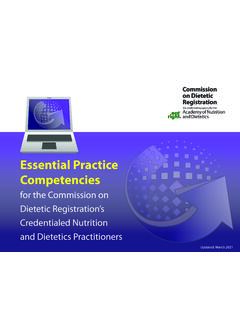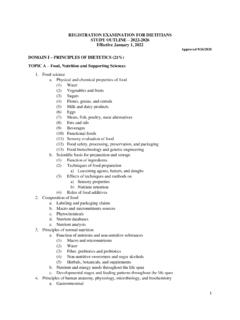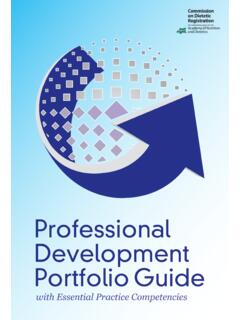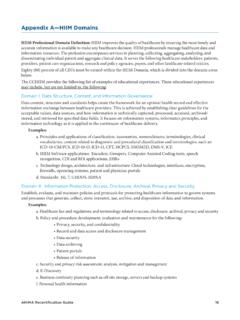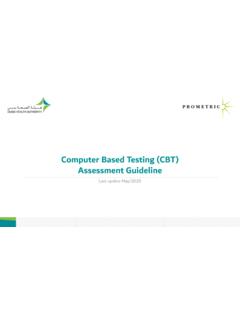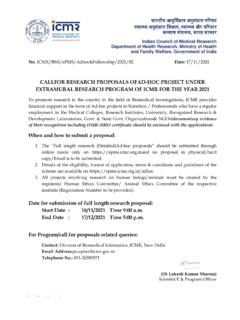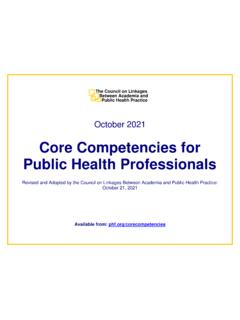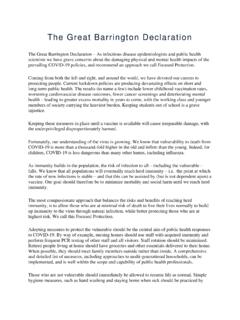Transcription of Essential Practice Competencies
1 Essential Practice Competenciesfor the Commission on Dietetic Registration sCredentialed Nutrition and Dietetics PractitionersUpdated: October 2014 Essential Practice Competencies for the Commission on Dietetic Registration s Credentialed Nutrition and Dietetics PractitionersIntro ..4 Sphere 1: Ethics and Professionalism ..7 Sphere 2: Communications ..13 Sphere 3: Leadership and Advocacy ..16 Sphere 4: Critical Thinking and Decision Making ..19 Sphere 5: informatics ..21 Sphere 6: Research, Evidence-Informed Practice and Quality Improvement ..26 Sphere 7: Safety and Risk Management ..30 Sphere 8: Food, Nutrition and Dietetics and Physical Activity ..34 Sphere 9: Education and Counseling ..38 Sphere 10: Clinical Care.
2 44 Sphere 11: Business, Industry and Product Development and Marketing ..50 Sphere 12: Community and Population health ..56 Sphere 13: Foodservice Management ..62 Sphere 14: Organization Management ..65 Practice Competencies Glossary ..70 ContentsEssential Practice Competencies for the Commission on Dietetic Registration s Credentialed Nutrition and Dietetics Practitioners 4 The Commission on Dietetic Registration has developed the Essential Practice Competencies for CDR Credentialed Nutrition and Dietetics Practitioners to provide overarching validated standards for two credentials, the Registered Dietitian (RD) or Registered Dietitian Nutritionist (RDN), and the Dietetic Technician, Registered (DTR) or Nutrition and Dietetics Technician, Registered (NDTR).
3 Practice Competencies define the knowledge, skill, judgment and attitude requirements throughout a practitioner s career, across Practice , and within focus areas. Competencies provide a structured guide to help identify, evaluate, and develop the behaviors required for continuing competence. Unlike entry-level Competencies , which focus on preparation and evaluation for minimum competence upon completion of an ACEND (Accreditation Council for Education in Nutrition and Dietetics) education program and during early years of Practice , the Essential Practice Competencies are intended for use throughout a nutrition and dietetics practitioner s and Application of the Essential CompetenciesThere is an expectation that Competencies will be used by the dietetics profession to: identify learning needs; guide continuing professional development and ongoing competence; assist in career progression and professional development.
4 And to communicate the role and competence of the profession to stakeholders ( employers, external accreditation bodies, the public, etc.).The Competencies are broad in nature and foundational to both RDN and NDTR Practice . However, the relevance of the Essential Competencies depends on the individual practitioner s role and responsibilities. It may not be possible or necessary for the individual to apply certain Competencies in a specific Practice context. The Essential Competencies and relevant performance indicators are applied and interpreted in light of the requirements of the individual s Practice context and particular situation. The relevance of a performance indicator will depend on the client, Practice setting, situation, and role.
5 Thus, not all of the Competencies or performance indicators within a sphere must be demonstrated by the depth and breadth of the application of the Competencies also differentiates between the RDN and NDTR. Four factors impact this: the client, the Practice setting, the situation, and an individual s educational preparation. The Competencies apply differently depending upon the complexity of the situation, the client s condition, and the type of the environment in which the activity is performed. The performance indicators or behaviors associated with the competency will be different when applied in different situations. For example, some practitioners may participate in research projects, but others may lead a research initiative.
6 RDNs independently conduct nutrition assessment to evaluate an individual s health , malnutrition and disease, whereas NDTRs perform aspects of nutrition screening under the supervision of an RDN to support the RDN s comprehensive assessment. The more complex the client and/or situation, and the more dynamic the environment, the greater the level of competence required. Project ProcessDevelopment and validation of the Essential Practice Competencies involved seven key steps: 1. literature review and global environmental scan of nutrition and dietetics Competencies ; 2. development of the Competencies framework and outline; 3. Competencies writing sessions;4. stakeholder consultations;5. mapping of the Competencies to the CDR Professional Development IntroductionEssential Practice Competencies for the Commission on Dietetic Registration s Credentialed Nutrition and Dietetics Practitioners 5 Portfolio s existing Learning Need Codes (LNCs); 6.
7 National validation study of the Essential Practice Competencies by CDR s credentialed nutrition and dietetics practitioners; 7. finalization and CDR approval. CDR held focus group webinars with 78 practicing RDNs and NDTRs, representing a variety of Practice roles and perspectives, to establish the Competencies outline and framework. This functional framework comprised four hierarchy levels: A group of 19 RDNs and NDTRs, representing various geographic and Practice perspectives, met for a five day writing workshop, differentiating RDN and NDTR Practice based on the established outline and framework. Essential Practice CompetenciesThere are 14 spheres, 55 Practice Competencies for RDNs (50 for NDTRs), and 352 performance indicators for RDNs (271 performance indicators for NDTRs).
8 These Essential Practice Competencies are: Broad enough to encompass the range of activities within the profession ( , clinical care, management, food services, research, education, etc.), and to recognize that RDNs and NDTRs assume many unique roles ( , marketing for a food manufacturer, informatics for a health system, etc.). Descriptive of the different Practice roles between the RDN and NDTR credentials. Applicable to all credentialed nutrition and dietetics practitionersCore Essential Practice CompetenciesThe core Essential Practice Competencies describe the knowledge, skills, judgment and attitudes that apply to all credentialed practitioners regardless of role, area of Practice , or 1: Ethics and ProfessionalismSphere 2: CommunicationsSphere 3: Leadership and AdvocacySphere 4: Critical Thinking and Decision MakingSphere 5: InformaticsSphere 6: Research, Evidence-Informed Practice and Quality ImprovementSphere 7: Safety and Risk Management Sphere 8: Food, Nutrition and Dietetics and Physical Activity Sphere 9.
9 Education and CounselingFunctional Essential Practice CompetenciesThe functional Essential Practice Competencies describe the role-specific knowledge, skills, judgment and attitudes needed for a particular Practice focus. Sphere 10: Clinical CareSphere 11: Business, Industry and Product Development and MarketingSphere 12: Community and Population HealthSphere 13: Foodservice ManagementSphere 14: Organization ManagementStakeholder ConsultationThroughout the development process, CDR sought feedback from various Academy of Nutrition and Dietetics organizational units ( , BOD, ACEND, HOD, QM, CFP, MIGs, DPGs, and Affiliates) to ensure that the final Competencies reflected current Practice . Introduction (continued) Essential Practice Competencies for the Commission on Dietetic Registration s Credentialed Nutrition and Dietetics Practitioners 6 National Validation StudyA national validation study was conducted to validate the relevance of the Competencies and performance indicators, and to assess their importance in Practice .
10 The survey was developed and circulated to 90,677 credentialed RDNs and NDTRs. 18,934 RDNs and 1,349 NDTRs logged into the survey, where they obtained general information on the Competencies and their intended purpose. Because the respondents were asked to rate the functional Competencies relevant to their area of Practice , the number of responses to Competencies and performance indicators naturally decreased in Spheres 10 through 14. The RDN survey results reflected strong reliability estimates at for the frequency scale, and for the importance scale. The NDTR reliability estimates were within acceptable range at for the frequency scale, and for the importance scale. Overall, the collected data confirmed that the Competencies developed are relevant and important to current Practice .
